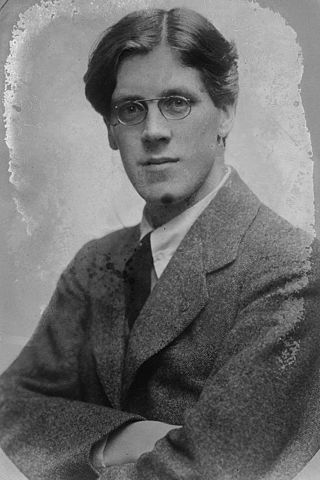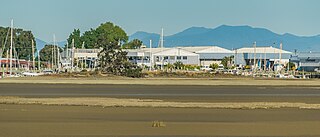This article includes a list of general references, but it lacks sufficient corresponding inline citations .(September 2012) |
Riverside Community is a village at Lower Moutere, near Motueka, New Zealand, founded by Christian pacifists in 1941.
This article includes a list of general references, but it lacks sufficient corresponding inline citations .(September 2012) |
Riverside Community is a village at Lower Moutere, near Motueka, New Zealand, founded by Christian pacifists in 1941.
Riverside is one of the oldest Intentional Communities in New Zealand and has its beginnings in 1941 when a group of Christian Pacifists agreed to adopt a way of life based on co-operation. They wanted to demonstrate that this was a practical alternative to the competitive ways of normal society which are a major contributor to wars.
One of the organisers was the pacifist leader Archibald Barrington. [1]
One of the group contributed 30 acres of farmland and orchard, in the Lower Moutere Valley, and some of them moved there to live. Several of the founding members were conscientious objectors to the compulsory military scheme during the Second World War. These men spent the war years on a prison farm in the Taranaki Region while their wives and children moved to the small farm in Lower Moutere. After the war, the Religious Charitable Riverside Community Trust (RCT) was founded and, over time, new land was purchased and the hilly scrub land cleared and cultivated.


Today Riverside consists of 208 hectares of land, mainly used as a dairy farm. It has a growing number of secondary businesses including a Cafe, a Community Centre, Orchards, Organic Gardens and a shop. Income is shared and distributed depending on family size rather than occupation. Riverside assets are owned by the Trust and there is no private ownership of houses or cars. The community's general fund helps to meet basic needs such as health care, dental care, electricity and phone while other needs are subsidised like education and travel costs. Community families live in self-contained homes and children attend local schools or choose to home educate.
The farm produces beef, dairy products, eggs and vegetables to supply either members and local neighbours. There is a shared lunch every Wednesday open to everyone. Permanent members are about 20 adult members and 10 children, but a limited number of tenants, visitors and volunteer workers can sometimes swell the numbers to 80.
There are several festivals and commemorations held each year: Spring Festival, Harvest festival, Winter Solstic, Easter, Christmas, Riverside Founders Day, Matariki, International Conscientious Objectors day and commemorate Parihaka Peace Day.
All members are responsible for the management of the community and assets and decisions are made by consensus by a weekly meeting. The community is committed to environmental and sustainability issues as well as to social justice both locally and internationally. Every year, funds are allocated to support other organisations with programmes aimed at the eradication of poverty and suffering. The main contribution to peace making is the way of life promoted and members' adherence to the founders basic principles; “If a group of individuals pool their resources, cooperate and live simply, they can create a resource and surplus income to be used for the greater good of society”.[ This quote needs a citation ]

Pacifism is the opposition or resistance to war, militarism or violence. The word pacifism was coined by the French peace campaigner Émile Arnaud and adopted by other peace activists at the tenth Universal Peace Congress in Glasgow in 1901. A related term is ahimsa, which is a core philosophy in Indian religions such as Hinduism, Buddhism, and Jainism. While modern connotations are recent, having been explicated since the 19th century, ancient references abound.

A conscientious objector is an "individual who has claimed the right to refuse to perform military service" on the grounds of freedom of thought, conscience, or religion. The term has also been extended to objecting to working for the military–industrial complex due to a crisis of conscience. In some countries, conscientious objectors are assigned to an alternative civilian service as a substitute for conscription or military service.
The War Resisters League (WRL) is the oldest secular pacifist organization in the United States. The organization is celebrating its centennial from the founding date of October 19 into 2024.
The Fellowship of Reconciliation is the name used by a number of religious nonviolent organizations, particularly in English-speaking countries. They are linked by affiliation to the International Fellowship of Reconciliation (IFOR).

Archibald Fenner Brockway, Baron Brockway was a British socialist politician, humanist campaigner and anti-war activist.
Peace churches are Christian churches, groups or communities advocating Christian pacifism or Biblical nonresistance. The term historic peace churches refers specifically only to three church groups among pacifist churches:
Archibald McColl Learmond Baxter was a New Zealand socialist, pacifist and conscientious objector.

The Civilian Public Service (CPS) was a program of the United States government that provided conscientious objectors with an alternative to military service during World War II. From 1941 to 1947, nearly 12,000 draftees, willing to serve their country in some capacity but unwilling to perform any type of military service, accepted assignments in "work of national importance" in 152 CPS camps throughout the United States and Puerto Rico. Draftees from the historic peace churches and other faiths worked in areas such as soil conservation, forestry, fire fighting, agriculture, under the supervision of such agencies as the U.S. Forest Service, the Soil Conservation Service, and the National Park Service. Others helped provide social services and mental health services.
The No More War Movement was the name of two pacifist organisations, one in the United Kingdom and one in New Zealand.

Christian pacifism is the theological and ethical position according to which pacifism and non-violence have both a scriptural and rational basis for Christians, and affirms that any form of violence is incompatible with the Christian faith. Christian pacifists state that Jesus himself was a pacifist who taught and practiced pacifism and that his followers must do likewise. Notable Christian pacifists include Martin Luther King Jr., Leo Tolstoy, Adin Ballou, and Ammon Hennacy.
Mark Plowman, generally known as Max Plowman, was a British writer and pacifist.
The Anglican Pacifist Fellowship (APF) is a body of people within the Anglican Communion who reject war as a means of solving international disputes, and believe that peace and justice should be sought through nonviolent means.

Ormond Edward Burton was a New Zealand teacher, soldier, war historian, Christian pacifist, Methodist clergyman, and writer, who was the co-founder of the Christian Pacifist Society of New Zealand.
Millicent Amiel Baxter was a New Zealand peace activist and pacifist.
Hubert Reginald Holdaway was a New Zealand teacher, orchardist, Methodist lay preacher, pacifist and communitarian. He was born in Lower Moutere, Nelson, New Zealand on 18 January 1896.

Mark Briggs was a New Zealand labourer, auctioneer, pacifist, socialist and politician. He was born in Londesborough, Yorkshire, England, on 6 April 1884.
Archibald Charles Barrington was a New Zealand clerk, secretary and pacifist. He was born in Wellington on 8 May 1906.
Fred Haslam was a Canadian administrator and pacifist.

Lower Moutere is a settlement in the Tasman District of New Zealand's upper South Island. It is a farming community it the Lower Moutere valley, 6 km (3.7 mi) from Motueka close to the Moutere Inlet.
The Patapsco Camp or the CPS Camp No. 3 was a Civilian Public Service camp established during World War II for conscientious objectors. Located at the Patapsco Valley State Park near Baltimore, the site was the first Civilian Public Service camp for conscientious objectors in the United States.